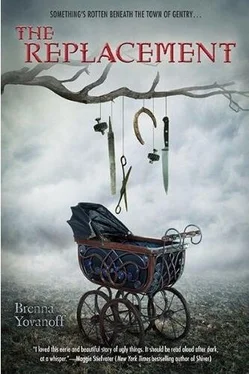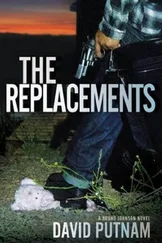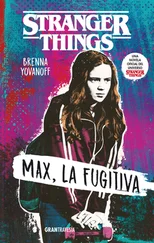“You look awful,” he said as I came up next to him. It was a strange thing to say because it was rude and he was a stranger, but also because he wasn’t looking at me.
He had on a long coat with frayed cuffs and military stripes sewed onto the sleeves. There was a row of holes down the front, like someone had cut the snaps out.
“Your eyes,” he said suddenly, turning to stare at me. “Your eyes are black as stones.”
I glanced back over my shoulder to make sure there was no one else on the path before I nodded. My eyes were always dark, but iron made it worse. The dizziness was nearly gone, although I still felt sweaty and pale.
The man leaned closer. The skin around his eyes was bruised, oily looking. His complexion was an unhealthy shade of yellow. “I could help you.”
“I’m not an expert or anything, but you look like you need a little more help than I do.”
That made him smile, which didn’t improve his appearance. “My face is simply a result of my poor breeding, but you, my friend, are in bad shape. You need something to get you back on your feet.” He pointed across the bridge to the other side of the ravine, my quiet suburban neighborhood and my house. “That way lies misery. It’s what you’re going home to, and I think you know it.”
Rain pattered on the bridge. I glanced over the rail and down at the slag heap. It was so black that you could almost see other colors. My heart was beating harder than was comfortable.
“I’m not interested,” I said. My mouth was dry.
He nodded gravely. “But you will be.”
It didn’t sound like a threat or a warning. His voice was flat. He took a watch out of his coat pocket and turned away from me, flipping the lid open but staring down at the slag heap.
After a minute, I edged past him, careful not to let our shoulders touch. I crossed to where the path climbed the other side of the ravine and came out at the intersection of Orchard and Concord. I kept going, trying hard to fight the panic in my chest. A small, fearful part of me was convinced he was following, he was coming up behind me, but when I turned back toward the bridge, there was nothing.
On Concord Street, all the houses were two stories high, with big wraparound front porches. Three houses down from ours, Mrs. Feely was out in her yard, nailing a horseshoe to the porch railing. Her hair was gray, arranged in tight poodle curls all over her head, and she was wearing a yellow rain slicker. She glanced over her shoulder and when she saw me, she smiled and gave me a wink.
Then she went back to nailing up the horseshoe, like the iron would protect her from something big and scary. I headed home, with the clang of her hammer following me down the street.
In the front hall, I dropped my book bag and yanked off my hoodie. There was blood all over the sleeve, and I debated just throwing it away, but I figured my dad would have something to say about that.
The laundry room was in a little alcove off the hall. I didn’t like to go in there. The washer and dryer were both stainless steel and the room was so small that the air always had a dense, poisonous smell to it. For a minute, I considered running the washer anyway, but even just standing with the door open was making my pulse hammer in my ears. I wadded up the hoodie and made a mental note to ask Emma if she’d wash it for me. In scalding water. With bleach. Then I shoved it in the hamper and headed for the kitchen.
From the back of the house, I could hear the clack of the keyboard. My mom was in the office, tapping away at her computer.
“Mackie,” she called, “is that you?”
“Yeah.”
“Don’t let your father catch you skipping class, okay?”
“Yeah, okay.”
I got a glass of water and sat at the table, looking at the tablecloth and trying to figure out the plaid pattern. It went red, black, red, white, green, and then I lost track.
When Emma came in, I was so out of it that her hand on my shoulder made me jump. I started to ask about the laundry but stopped when I realized there was someone else with her. The second girl was tall and serious looking, with a long, bony face.
Emma got a jar of peanut butter from the pantry and took out a plastic picnic knife.
“Hey, ugly,” she said, reaching to tousle my hair. “You’re home early.” She glanced across the hall at the office door, then said so quietly she was almost mouthing it, “Are you feeling okay?”
I wiggled my hand in a so-so gesture. “Aren’t you supposed to be in botany?”
Emma was nineteen and not the kind of person who skipped class. She was taking every science course the junior college offered and her dedication was kind of scary.
“Professor Cranston gave us outside time to work on our group project.” She waved her plastic knife at the other girl. “That’s Janice.”
Janice sat down across from me and folded her hands on the table. “Hi,” she said. Her hair was muddy brown and hung in wild snarls on either side of her face.
I nodded at her but didn’t say anything.
She was looking at me like I was a laboratory specimen, one of those bugs with the pins through it. Her eyes were huge and dark. “Why does she call you ugly?”
Other people could make pretty much any situation seem normal just by saying the right words. But I wasn’t like that. I stared hard at the backs of my hands and waited for Emma to ride in and take over the conversation.
Emma, the master liar. Queen of my-brother-is-normal, my-brother-is-shy. My brother is sickly, has allergies, mono, food poisoning, the flu, the biggest, messiest lie of all: My brother.
Reliably, she came up behind me and leaned her chin on the top of my head. Her hair was fine and limp. Stray pieces had come loose from the rubber band and hung down so they tickled my face. “When he was a baby, he was the ugliest thing you ever saw in your life . All yellow and wrinkly. And he had these teeth .” She let me go and turned in the direction of the office. “A full set—right, Mom?”
“Just like Richard the Third,” my mom called back.
Janice was still looking at me, crouched at the table like she was hungry. “Well, he’s not ugly now.”
“I’m going upstairs,” I said, and pushed my chair back.
In my room, I lay on the bed but couldn’t get comfortable. I felt restless, like little bugs were crawling around under my skin. The man on the bridge had been waiting for me— me , and not some random kid cutting across the bridge. He’d stared right into my face like he was looking for something. I was still cold and shaky from the blood, worse than I’d felt in a while and worse than I used to feel, ever.
Finally, I got up and went over to my closet. I got out my bass and my amp and plugged in the headphones.
The bass was strung with Black Beauties, and I’d pulled off the metal frets. If the song was fast, I used a pick, and when I didn’t, the lacquer coating on the strings kept the steel from burning my fingers. But even if I had to play with bare strings, I’d probably do it anyway, just to get that low, humming sound, that feeling. Sometimes it’s the only thing that helps. Anything that scares or worries you is suddenly a hundred miles away.
I played the lines to songs I knew and to songs I made up. I played progressions full of high, clear notes that hung forever and heavy tones that thumped and doubled back on themselves again and again and again.
After a long time, I started to get a strange feeling. Like someone was listening. Not the feeling of the house or even of Emma standing out in the hall. It was more like the warm, anxious rush of playing for a stranger. When I took the headphones off and went to the window, though, the backyard was empty. More time had passed than I’d realized and it was starting to get dark. I stared out at the lawn and the bushes, but it was ridiculous to think that someone had been listening. Completely ludicrous, when I was sitting there with the sound filtering through my headphones.
Читать дальше












